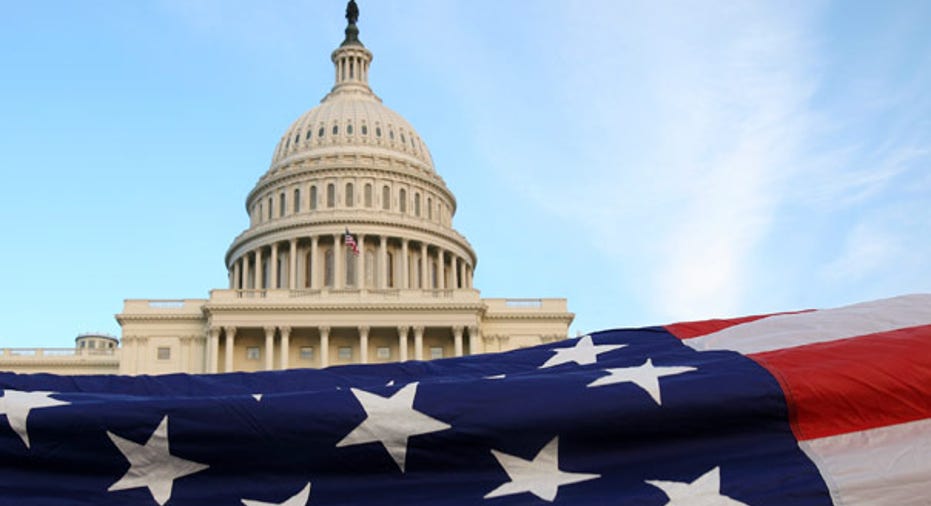Treasury Says U.S. Default Potentially 'Catastrophic'

The Treasury Department said Thursday that a default by the U.S. on its debt caused by the ongoing budget standoff in Congress could have a “catastrophic” effect on the U.S. economy.
Given the already fragile state of the economy, the Treasury Department said in a report that default by the U.S. and its ripple effect through the global economy could lead to frozen credit markets, a plunge in the value of the dollar, skyrocketing interest rates, all of which could instigate a financial crisis mirroring that of 2008 “or worse.”
Congressional Republicans and Democrats are stuck in a stalemate over the 2014 budget, one that has helped lead to the first government shutdown in 17 years. That battle is widely expected to extend into the debate over a vote to raise the debt limit, which Treasury has said must be increased by mid-October or the U.S. will run out of money to pay its debts.
A similar standoff in the summer of 2011 prompted ratings firm Standard & Poor’s to lower the U.S. credit rating, an unprecedented event that roiled securities markets for weeks.
The Treasury report referenced the fallout from that 2011 stalemate, which ended in a compromise that delayed actual spending cuts, suggesting that another impasse would negatively impact consumer and small business confidence, stock price volatility, credit risk spreads and mortgages.
Government Shutdown Could Exacerbate Situation
“As we saw two years ago, prolonged uncertainty over whether our nation will pay its bills in full and on time hurts our economy," Treasury Secretary Jack Lew said in a statement released with the report. “Postponing a debt ceiling increase to the very last minute is exactly what our economy does not need – a self-inflicted wound harming families and businesses. Our nation has worked hard to recover from the 2008 financial crisis, and Congress must act now to lift the debt ceiling before that recovery is put in jeopardy."
The report goes on to cite the various ways even the threat of a default could harm U.S. consumers and businesses: sharp declines in household wealth, an increase in the cost of borrowing for businesses and households, and a decline in private sector confidence, all of which would further hamper the sluggish economic recovery.
And the ongoing partial government shutdown, which has furloughed more than 800,000 federal employees since Tuesday, will only exacerbate the situation, the report says, as those employees scale back on spending, belt tightening that will have a domino effect in areas where large numbers of federal workers aren’t getting paid.
Also Thursday, International Monetary Fund chief Christine Lagarde said failure to raise the U.S. debt ceiling could damage not only the United States but the rest of the global economy.
"It is 'mission-critical' that this be resolved as soon as possible," she said in a speech in Washington, ahead of the IMF and World Bank annual meetings next week, according to Reuters.
Lagarde said growth in the U.S. has already been hurt by too much fiscal consolidation – the across-the-board federal cuts known as sequestration that took effect in March -- and will be below 2 percent this year before rising by about 1 percentage point in 2014.
Recession Worse than Any Since the Great Depression
Banking analyst Dick Bove is also predicting dire consequences if Congress fails to reach an agreement on the debt ceiling.
“It is my strong belief that a true default by the United States Treasury would wipe out bank equity. All bank lending to the private sector in the United States would stop, immediately. Existing loans would not be rolled over. Immediate repayment would be demanded,” Bove said in a report issued Thursday.
Bove echoed the predictions of Lew and Lagarde that a default – even the real threat of default – could have an overwhelming global impact. In short, the analyst believes a default could lead to a global depression.
“The devastation to the United States would be so severe that it would take decades to recover from the Depression caused by a default and the attendant dumping of trillions of dollars of U.S. Treasury securities on the global financial markets,” Bove said.
The Treasury report said the 2011 standoff left “long-lasting scars” on financial markets and caused stress that lasted for “many months.”
The report concluded: “In the event of a default, the U.S. economy could be plunged into a recession worse than any seen since the Great Depression. The U.S. dollar and Treasury securities are at the center of the international finance system. In the catastrophic event that a debt limit impasse were to lead to a default on Treasury securities, financial markets could be shaken to their core as was seen in late 2008, which resulted in a recession worse than any seen since the Great Depression.